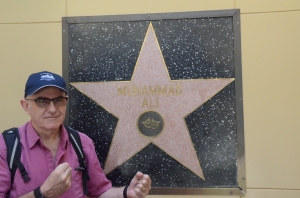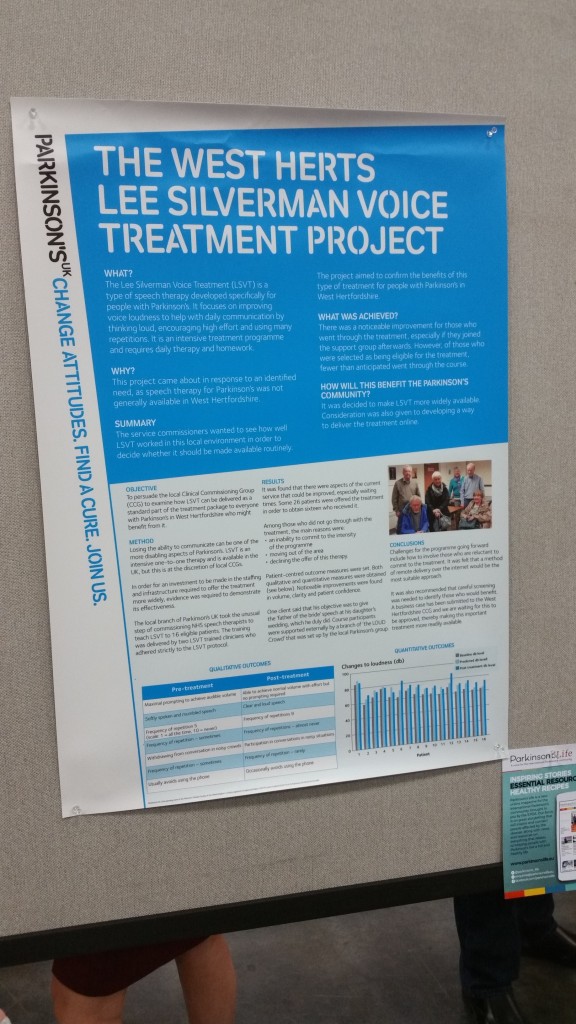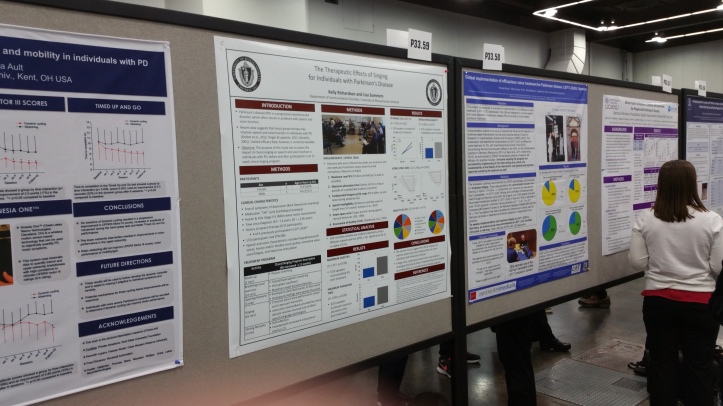Background. I’m 60 and was diagnosed with Parkinson’s two years ago so I am a new Parky. I’m an engineer by profession so I can do sums but please excuse the spelling and grammar. I’m not technical when it comes to medical terms but I think I’m learning fast. I feel I could write a prescription for exercise already. My wife Pauline came with me and while technically a care giver that does no justice to my rock of support. Her thirst for knowledge to help improve and prolong my quality of life leaves me shaking.
The World Parkinson Congress WPC was a collection of 4600 people. The delegates are distributed between doctors, researchers, people with Parkinson’s and care givers. It happens every 3 years and has been growing each session. I’ve been to a lot of different conferences over the years, some of which were bigger smaller wetter and dryer but never one like this where the patients were there as the focused customers. It would be like being at a petroleum conference where the wells and reservoirs were there as the customers and could hear what was going to be treated with but the wells had an input to say what was ok and suggest what to try instead. Or going to an environment conference where the trees were invited and allowed to speak.
A great introduction to the congress and an update on the current state of knowledge in all the research areas is on the podcasts prepared by Parkinson patients in the following. Well worth the listen.
http://www.worldpdcoalition.org/?page=CountdownPodcasts
I’m not totally clear on what is available however the app is excellent and give a concise summary of the topics and the papers.
http://www.wpc2016.org/news/309831/View–download-speaker-slides-.htm
To get a feel for the event a good facebook page to check out is World Parkinson Congress.
Or go to
http://www.wpc2016.org/?page=HotTopics#Gersel
And subscribe to e news.
Arriving at the conference centre was a little apprehensive as you really don’t know what to expect. You immediately start looking for people like you, with a shake and a shuffled walk. Once you see them you relax a little then you see more in wheelchairs and with dyskinesia and that comes a little more unsettling because while I have read and learned as much as I could about Parkinson in the last two years, I have deliberately avoided the last two chapters in the book. As the hours and days progressed the casual nature of the atmosphere allowed us to mix more and I felt less and less conscious of my disability.
It would be impossible for me to attempt to go over even a small part of what was presented but I think I can best sum up our experience by saying that when it got to Friday evening we wished it was all starting again. We had learned enough that we knew what we wanted to learn more on. We also felt bad that we missed some topics. That was not because we went to the wrong stuff but due to conflicts.
I’ll try and hit a few of our highlights.
On opening night we had a talk from May Ali, Mohamed Ali’s daughter. It’s easy to see the confidence pass down a generation and she gave an excellent speech and made some great points. Our favourite was the story of her dad after lighting the flame in the Olympics Atlanta, he was approached afterwards by a fellow afro American southern lady who said she used to be ashamed of her tremor and hid it away and did not go out. However after seeing Ali shaking to light the torch she now shows everyone she has a shake just like Mohamed Ali.


We then had 3 days of intense activity (08.00 to 18.30) with topics, workshops


and round tables as well as the hundreds of posters. I really wish I had seen more of the posters as the level of knowledge in each one and the detail was outstanding. Nothing trivial here.


Day one’s main topic was on Deep Brain Stimulation. My take away from that was that while DBS may not be suitable for some patients it is a very underutilized procedure that can have a great impact on peoples lives. In the afternoon I attended the talks on gut microbiome and nutrition which were informative. Looks like there is still so much to know about the gut due to all the bacteria there (good and bad) but on nutrition the value of a healthy diet is unquestioned and a Mediterranean diet seems the optimum. It was a pity about the clash that afternoon as I missed the talks on both sex and cannabis.
The second day’s main topic was genes and environment. My take away was that so often when we find a “breakthrough” the disease shows how varied and complex it is and how hard it is to pin down. We are still on the learning curve in this area. The workshop I attended was on staying active which was just reinforcement on what I believe anyway. Day 2 had an interesting panel discussion on living with Parkinson’s and 3 patients discussed their experiences. Andy from New Zealand was an active sportsman when he was diagnosed and he has done a load of work since to highlight his story and a great video. Check out ‘Smaller’ on YouTube. https://www.youtube.com/watch?v=3nI17vFWYaQ
Brian Grant was an NBA player who discussed his discovery of his condition and what that meant for him. A really honest motivational speaker. Both guys discussed how they suffered from depression when they were diagnosed. And then there was Linda Olson. Linda was involved in a terrible car crash when hit by a train and lost both legs and an arm. Then as she had come to term with that she was diagnosed with Parkinson’s. It’s hard to imagine how anybody would deal with that but Linda seemed to be able to. As she says she has the happy gene and just got on with it. I think I am also lucky in that I have a lot of that gene so it’s just a case of looking at making the best of it.
Each day there were round tables however while the topics looked really good it was near impossible to get onto a table because they were oversubscribed. I’d be interested to hear how effective they were. Some of the feedback I heard was that there were too many roundtables in the same room and they depended on the strength of the leader to keep them on track.
Day 3 had Stem Cells as the main topic and certainly the UK had a lot to say on this with excellent contributions from Roger Barker of Cambridge and Tom Isaacs from the Cure Parkinson’s Trust. A lot of warnings here because while there has been a lot of progress and some interesting things happening it is still early. There are some procedures ongoing in Australia that they are very worried will give stem cells a bad name because they have not analysed the impact of what they are doing. There is a real worry that stem cells are being oversold. You should not be asked to pay so BUYER BEWARE.
The afternoon had the usual high quality talks and presentations. I tracked down one which referenced sweating as that is one of the symptoms I have, so I had a particular interest. While the talk was good it was very general so my ears picked up when I heard one of the questions at the end. I decided to track down that person as his seemed to be very familiar with the problem. I caught him as he left and after confirming that he was the one who asked the sweating question I asked him what kind of problem he had? He replied HE did not have a problem but one of his patients did. Just another great example of the mix between the patients and the doctors. He was great and discussed some explanations with me.
During the day I tried the Tai Chi and Boxing both of which I was impressed with. Great for balance and focus.


We also spend some time on Friday at the posters. It was great to see the passion and commitment of all the participants. We met people from Manchester University and it was great to see how many posters were from or supported by Parkinson UK. Steve Ford was there as a moderator at some of the talks.
Some of the UK posters









some other posters





A list of some of the current trials

But a key issue was that I met the community and I met some great new friends.


Overall it was a great experience and we are looking forward to Japan in 3 years time and the only issue is what to do in Japan between WPC July 2019 and RWC September 2019 when the Rugby World Cup starts but we got this map to help decide.




If you are going to Japan I highly recommend visiting Kyoto – fabulous city with lots of history and beautiful temples.
LikeLike
If your planning to stay in Japan from July to the end of the RWC, you’re going to need a substantial amount of moolah!!!
LikeLike